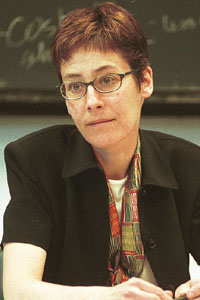- Whether preschool classroom environments and processes can be positively affected by implementing a range of interventions of varying intensity;
- Whether children’s language and pre-literacy skills, as well as their emotional and behavioral adjustments, can be improved, and children’s behavioral difficulties can be reduced through classroom-based interventions; and
- Whether the intensity of the intervention will change the magnitude of the intervention’s impact on children’s school readiness.
Harris’ Raver gets funding to study school readiness, academic advances
By Peter SchulerNews Office
 C. Cybele Raver, Associate Professor in the Irving B. Harris Graduate School of Public Policy Studies and Director of the Center for Human Potential, has received $3.3 million in funding for a five-year, collaborative research project on low-income children’s preschool readiness. |
The Center for Human Potential and Public Policy at the Irving B. Harris Graduate School of Public Policy Studies and its Director, C. Cybele Raver, Associate Professor in the Harris School, have recently received major grants from the U.S. Department of Health and Human Services and the McCormick Tribune Foundation to expand the center’s research and training, and strengthen its national and regional leadership in child and family policy.
As principal investigator, Raver has been awarded $3.3 million from the U.S. Department of Health and Human Services to support a five-year, collaborative research project, “Emotions Matter: Testing the Impact of Classroom-based Integrated Intervention in Promoting Low-Income Children’s School Readiness.”
The study will examine relations between young children’s emotional readiness in preschool and their academic achievement later on in kindergarten and first grade. The department’s National Institute of Child Health and Human Development and its Administration for Children and Families; the Office of Special Education and Rehabilitative Services; and the Assistant Secretary for Planning and Evaluation provided the funding.
“Few studies have experimentally tested whether classroom-based interventions that target improvements in young children’s emotional and behavioral adjustment also improve their language skills, pre-literacy skills and academic achievement upon entry into formal schooling,” said Raver. “My hope is that this study will give us clear answers to important developmental questions as well as to pressing policy questions.”
Raver’s studies will draw on developmental, educational and clinical psychological perspectives, and will follow 640 preschool-aged children for two years to test the following:
The McCormick Tribune Foundation, which has been a principal source of funding for the center in the past, also has provided an $804,000 grant to the Center for Human Potential and Public Policy, a portion of which will go to Raver’s study. “Currently, there are few organizations that bridge the gap between developmental psychology and economics to address pressing policy questions in the areas of early child intervention, education, poverty, inequality and child health,” Raver said. “The McCormick Tribune Foundation has recognized the multidisciplinary strengths of the center, which make us well-suited to serve as a leader by generating rigorous, multidisciplinary and innovative scholarship on both local and national levels.”
A developmental psychologist, Raver has directed the Center for Human Potential and Public Policy since 2002. Her research focuses on young children and families facing economic hardship and examines the mechanisms that support children’s positive development in the policy contexts of welfare reform and early intervention.
The center, established in 1998 with a gift from Irving Harris, integrates research and policy perspectives to improve the health, welfare and development of children and their families. During the past five years, the center has built a core group of national leaders in child and family policy through graduate training.
From 2000 to 2003, the center trained 18 students, all of whom received financial support under the auspices of an earlier grant from the McCormick Tribune Foundation. Many of these students have gone on to careers in the field of child and family well being as policy analysts, researchers, clinicians and advocates.
The Center for Human Potential and Public Policy also has served a central role in promoting high-caliber scholarship through administering McCormick Tribune Foundation-funded faculty research awards and sponsoring multidisciplinary seminars.
The work of the center is focused on three objectives: to provide national and local leadership to generate high-caliber research on the development of effective social policy geared toward families and children; to train a new generation of leaders in child and family policy and research, building local and national expertise; and to foster communication between policy professional researchers.
![[Chronicle]](/images/sidebar_header_oct06.gif)